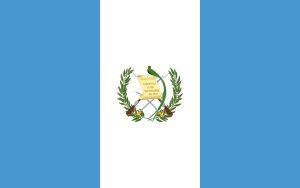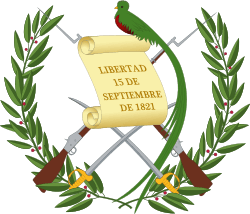Guatemalan general election, 2003
Guatemalan presidential election, 2003

|
|
|
|
|
|
|
General elections were held in Guatemala on 9 November 2003, with a second round of the presidential election held on 28 December.[1] Óscar Berger won the presidential election, representing the Grand National Alliance, a coalition of alliance of the Patriotic Party, the Reform Movement and the National Solidarity Party. The Alliance were also victorious in the Congressional elections, winning 47 of the 158 seats. Voter turnout was 57.9% in the Congressional elections, 58.9% in the first round of the presidential elections and 46.8% in the second.[2]
Presidential election
The ruling Republican Front of Guatemala (FRG) nominated former military ruler Efraín Ríos Montt to succeed outgoing president Alfonso Portillo Cabrera. A constitutional ban on former coup leaders (Ríos Montt during 1982-83) led to strong conflict inside the country, including the besiegement of Guatemala for a day: 24 July 2003, known as jueves negro ("Black Thursday"). In the first round of voting, Ríos Montt came third behind the centrist mayor of Guatemala City, Óscar Berger, and the more left-wing candidate Álvaro Colom.
Results
President
| Candidate |
Party |
First round |
Second round |
| Votes |
% |
Votes |
% |
| Óscar Berger | Grand National Alliance | 921,233 | 34.3 | 1,235,303 | 54.1 |
| Álvaro Colom | National Unity of Hope | 707,578 | 26.4 | 1,046,868 | 45.9 |
| Efraín Ríos Montt | Guatemalan Republican Front | 518,328 | 19.3 | |
| Leonel Eliseo Lopez Rodas | National Advancement Party | 224,127 | 8.4 | |
| Frederich García-Galont Bischof | Unionist Party | 80,943 | 3.0 | |
| Rodrigo Asturias | Guatemalan National Revolutionary Unity | 69,297 | 2.6 | |
| Eduardo Suger | Authentic Integral Development | 59,774 | 2.2 | |
| Jacobo Arbenz Villanova | Guatemalan Christian Democracy | 42,186 | 1.6 | |
| José Angel Lee Duarte | Social Participative Democracy | 37,505 | 1.4 | |
| Francisco Arredondo | National Union | 11,979 | 0.4 | |
| Manuel Eduardo Conde Orellana | Social and Political Movement National Change | 10,829 | 0.4 | |
| Invalid/blank votes | 253,390 | – | 91,298 | – |
| Total | 2,937,169 | 100 | 2,373,469 | 100 |
| Sources: Nohlen; European Union Electoral Observation Mission Final Report (p. 19 - first round, p. 20 - second round)[3] |
Congress
| Party |
PR |
District |
Total seats |
|---|
| Votes |
% |
Votes |
% |
| Grand National Alliance | 620,121 | 24.3 | 504,010 | 23.0 | 49 |
| Guatemalan Republican Front | 502,470 | 19.7 | 486,019 | 22.2 | 41 |
| National Unity of Hope | 457,308 | 17.9 | 362,859 | 16.5 | 30 |
| National Advancement Party | 278,393 | 10.9 | 270,549 | 12.3 | 17 |
| Unionist Party | 157,893 | 6.2 | 133,663 | 6.1 | 7 |
| New Nation Alliance | 123,853 | 4.9 | 59,891 | 2.7 | 6 |
| Guatemalan National Revolutionary Unity | 107,276 | 4.2 | 93,980 | 4.3 | 2 |
| Guatemalan Christian Democracy | 82,234 | 3.2 | 78,523 | 3.6 | 0 |
| Authentic Integral Development | 75,295 | 2.9 | 67,456 | 3.1 | 1 |
| Democratic Union | 55,793 | 2.2 | 55,321 | 2.5 | 2 |
| Social Participative Democracy | 28,425 | 1.1 | 29,109 | 1.3 | 0 |
| Transparency | 27,740 | 1.1 | 21,421 | 1.0 | 0 |
| Social and Political Movement National Change | 18,005 | 0.7 | 15,265 | 0.5 | 0 |
| National Union | 17,478 | 0.7 | 10,274 | 0.5 | 0 |
| Other parties | – | – | 4,204 | 0.2 | 0 |
| Invalid/blank results | 384,562 | – | 318,828 | – | – |
| Total | 2,936,936 | 100 | 2,511,372 | 100 | 158 |
| Sources: Nohlen; European Union Electoral Observation Mission Final Report (p. 19)[3] |
References


